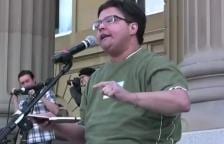When Alberta substitute teacher Jan Buterman told his public school board employer that he had been diagnosed with gender identity disorder, their response was to treat it as a medical issue and file the appropriate paperwork. It did not affect his employment with them in any other way.
So Buterman expected a similar response from the Greater St Albert Catholic school board, where he was employed from March to June 2008. Soon after he told the Catholic school board that his treatment would involve transitioning from female to male, he was fired.
“Since you made a personal choice to change your gender, which is contrary to Catholic teachings, we have had to remove you from the substitute teacher list,” wrote deputy superintendent Steve Bayus in an Oct 2008 letter to Buterman. The reason for this decision, which Bayus cites in his letter, is that “the teaching of the Catholic Church is that persons cannot change their gender. One’s gender is considered what God created us to be.”
Buterman met the response with shock. “It’s very difficult to put into words how you feel when you’re given something like this, it’s pretty overwhelming,” he tells Xtra.ca. “It blindsided me quite honestly.”
On Oct 1, 2009, Buterman filed a complaint with the Alberta Human Rights Commission against the Greater St Albert Catholic school board. “I do respect people’s right to believe things and this is no different,” he says. “I do not respect that they have a right to use that belief as a reason to prevent me from being employed, when their belief has nothing to do with my treatment protocols and that is not, to me, an issue that an employer should be speaking to.”
Buterman is supported by the Alberta Teachers’ Association and is represented by their lawyers, who fully expect the Human Rights Commission to accept his complaint, a process that takes about 10 business days.
While Buterman considers his firing to be in violation of the standards and policies that Alberta schools must follow, he is also seeking clarification. “I really do, at the end of the day, want clarification if people like me are not in fact accorded the same equality as other people in Canada, I think we would like to know if we’re not.”
This is not the first time that Edmonton, Alberta has acted as ground zero for minority rights. In 1991, Delwin Vriend was fired from King’s College in Edmonton for being gay. He tried to file a complaint with the Alberta Human Rights Commission, but they refused to hear it because the province’s human rights legislation didn’t protect citizens from discrimination on the basis of sexual orientation.
Vriend took Alberta to the Supreme Court of Canada, which ruled in 1998 that provinces could not exclude gays and lesbians from human rights legislation.

 Why you can trust Xtra
Why you can trust Xtra


